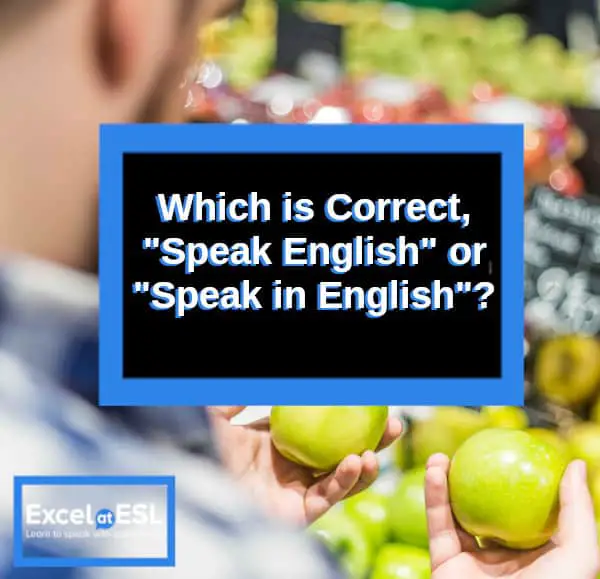English can be a confusing language. Adding just a few letters or one small word into a sentence can completely alter the meaning of what we say or write. This can cause a lot of frustration for language learners as well as be a point of curiosity. Knowing the nuance (small differences in meaning) between different expressions in English can be worth your time to learn. This type of knowledge separates advanced learners from those with near native-like fluency.
The short answer is, both of them are correct! Each of those expressions is grammatically correct English. Their differences lie with context. “I speak English.” and “I can speak in English.” both mean the same thing. However, using those phrases differently can completely change the meaning.
This more or less answers the question. If you want to use either of these phrases in your writing or while speaking, have no fear! Neither of them are incorrect English usage. However, if you’re keen to know more about how they can be used then keep reading. What follows is an in-depth discussion about exactly how each of those phrases are different and how their differences influence their possible meanings.
NOTE: The following is an in-depth discussion of English grammar. If you are not interested in sticky, complex grammar discussions, it’s good enough for you to know that both of them are correct and you can use them similarly. Otherwise, read on friend.
Terms to Know
Before we take a look at the specific structures of the two phrases above, we need to make sure we know and understand a couple of key grammar concepts that we will use in the following discussion.
Transitivity
The idea of transitivity has nothing to do with Transylvania or vampires! It’s a way of talking about a verb and the number of arguments it takes.
Most simply, there are two forms of transitivity for a verb (there are more, but let’s keep it simple).
- intransitive
- the verb does not take an argument.
- transitive
- the verb takes one argument.
So what do we mean when we say it takes an argument? Are the words yelling at each other in the sentence? No, of course not, what this means is whether or not the verb can take a direct object. Let’s take a look:
- He runs.
- This verb is intransitive. It can appear alone like this without anything to its right.
- He kisses her.
- This verb is transitive. It cannot normally appear alone without an object to its right. The man needs to be kissing something.
Often in English, verbs can be both transitive and intransitive. Using them in these two different ways can slightly alter the meaning of the sentence.
- The grass is growing.
- intransitive
- This is an action undertaken by the grass. It is becoming larger and healthier.
- I am growing the grass.
- transitive
- This is an action undertaken by me. I am caring for the grass and helping it become larger and healthier.
In each example, the meanings are similar but they are not exactly the same. The meanings are slightly different.
Phrases
A phrase is a term in linguistics used to describe a group of words. They can be very simple or they can be very complex. We use phrases to simplify how we think about a sentence. It becomes easier to analyze and dissect a sentence when we can group each part of the sentence into distinct phrases.
What are they?
A phrase is a group of words that are related. There are many types of phrases, but for our current discussion, we’ll focus on verb phrases and prepositional phrases.
- VP = Verb Phrase
- PP = Prepositional Phrase
At their most simple, phrases can be single words.
- VP(run)
- This verb phrase only contains the word “run”.
They can also have more than one word.
- PP(in the room)
- This prepositional phrase has three words in it.
We can use this idea to group related words together into single chunks that are easier to analyze and think about by using phrases.
- VP(run very quickly)
- PP(in the dark, dusty room on the left)
We can broadly group all of the words above into phrases. It makes it easier to understand how the sentence is formed when we do this.
The Differences
The main difference between these two phrases is their transitivity. The verb “to speak” can be used in both ways. It can be either transitive or intransitive.
Transitive
- Can you VP(speak English)?
- Here the word “English” is attached directly to the verb. It acts as its direct object.
The sentence above is a question about ability. The speaker would like to know about your ability to speak the English language. This is similar across all uses of “speak English”. The sentence is referring to the ability to communicate using English.
- I speak English.
- The man speaks English.
- Speak English!
Intransitive
- Can you VP(speak PP(in English))?
- Here the word “English” does not attach to the verb directly. It attaches to the preposition “in”, which then attaches to the verb.
The sentence above is a request. It would be used when the speaker would like you to start using English instead of some other language.
You may think that this is also a transitive usage, but it is not. This is because you can remove the prepositional phrase from the sentence and it still retains its meaning and intended usage.
- Can you VP(speak)?
This is still a request from the speaker for you to start speaking. The difference this time is that they aren’t specifying a language for you to speak in. They are only requesting that you speak.
If you go back to the transitive sentence and remove the word “English”, it changes the meaning and intention of the sentence. It becomes identical with the intransitive sentence above. The transitive sentence loses its meaning of inquiring about your English abilities and just becomes a request for you to speak.
Conclusion
That was quite a lot to take in! The smaller the difference, the more complex the explanation for the difference is. Hopefully, you learned something new from our discussion today.
Summarized simply, “speak English” is used in situations referring to a person’s ability to use the English language, while “speak in English” is used in situations where a request is being made.
However, as we already said. The difference is incredibly small. It’s possible for you to use each of those phrases interchangeably without sounding strange or risking anyone misunderstanding you.



